
- Afhalen na 1 uur in een winkel met voorraad
- Gratis thuislevering in België vanaf € 30
- Ruim aanbod met 7 miljoen producten
- Afhalen na 1 uur in een winkel met voorraad
- Gratis thuislevering in België vanaf € 30
- Ruim aanbod met 7 miljoen producten
Zoeken
Omschrijving
Painted Veils is a collection of essays written by James Huneker, a prominent American music critic and essayist in the early 20th century. The book includes a wide range of topics, from literature and art to music and philosophy. Huneker's writing is known for its wit, intelligence, and unconventional style, and this collection is no exception. The essays cover a diverse range of subjects, including the works of great writers such as Oscar Wilde, Edgar Allan Poe, and Walt Whitman, as well as the music of composers like Richard Wagner and Claude Debussy. Huneker also delves into the world of art, discussing the works of painters such as James McNeill Whistler and Henri Matisse. Throughout the book, Huneker offers his unique perspective on the cultural and artistic trends of his time, providing readers with a fascinating glimpse into the intellectual world of early 20th century America. Overall, Painted Veils is a must-read for anyone interested in the arts, culture, and intellectual history of this period.1920. From the author's notes: This Parable, with its notations and evocations of naked nerves and soul-states, is inscribed in all gratitude to the charming morganatic ladies, les belles impures, who make pleasanter this vale of tears for virile men. What shall it profit a woman if she saves her soul, but loseth love? Now the seven deadly virtues are: Humility, Charity, Meekness, Temperance, Brotherly Love, Diligence and Chastity. And the Seven Deadly Arts are: Poetry, Music, Architecture, Painting, Sculpture, Drama and Dancing. The book begins: Until the day of her death Easter never forgot that first night in New York. It was the initial twist of her ship's wheel, and the commonplace happenings which followed her entrance into the Maison Felice were to give force and direction to her entire life.This scarce antiquarian book is a facsimile reprint of the old original and may contain some imperfections such as library marks and notations. Because we believe this work is culturally important, we have made it available as part of our commitment for protecting, preserving, and promoting the world's literature in affordable, high quality, modern editions, that are true to their original work.
Specificaties
Betrokkenen
- Auteur(s):
- Uitgeverij:
Inhoud
- Aantal bladzijden:
- 310
- Taal:
- Engels
Eigenschappen
- Productcode (EAN):
- 9781162794518
- Verschijningsdatum:
- 10/09/2010
- Uitvoering:
- Paperback
- Formaat:
- Trade paperback (VS)
- Afmetingen:
- 152 mm x 229 mm
- Gewicht:
- 417 g

Alleen bij Standaard Boekhandel
+ 86 punten op je klantenkaart van Standaard Boekhandel
Beoordelingen
We publiceren alleen reviews die voldoen aan de voorwaarden voor reviews. Bekijk onze voorwaarden voor reviews.








